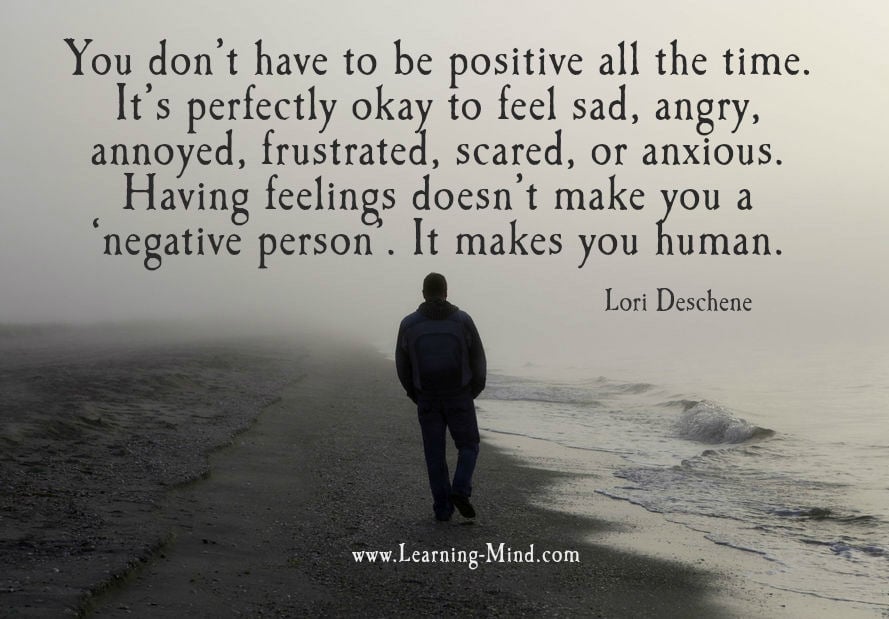
We all feel sad from time to time. But did you know that sadness can actually be beneficial in some ways?
We all experience sadness sometimes, occasionally it is because a life-changing tragedy has occurred but often it is because of a less significant upset or for no apparent reason at all. Either way, we often try to avoid or suppress these feelings. We may even feel guilty for being sad when we are so blessed in comparison with many people in the world.
You don’t have to be positive all the time. It’s perfectly okay to feel sad, angry, annoyed, frustrated, scared, or anxious. Having feelings doesn’t make you a ‘negative person’. It makes you human.
-Lori Deschene
It’s easy to criticize ourselves for failing to be positive and happy all the time, but there are benefits to sad feelings and it is well worth exploring these emotions and finding out what they have to teach us.
When we feel sad, it is often an opportunity to re-evaluate our lives and discover what really matters to us. For example, if we feel sad because of the illness of a loved one, this shows how important our relationships are and help us to put other worries, such as finances or home maintenance in perspective.
The more unexplained feelings of sadness are often a sign that something in our lives is out of balance or no longer serving us.
If we take the time to really think about our feelings of sadness, rather than suppressing or ignoring them, we can often come up with surprisingly insightful thoughts about our lives, perhaps realizing that certain relationships are causing us pain or that we are walking the wrong path in life.
Often, periods of sadness can be a sign that we are not taking the time to do important things like connecting with others, taking part in enjoyable activities, spending time in nature or just resting and relaxing.
In this way, our negative emotions can guide us by helping us work out what we want from life, what we care about and how to make our lives the best they can be. When we know what makes us feel bad, it becomes easier to identify what needs changing and to turn our attention to discovering what might make us feel good.
When the worst things happen, like a loss of a loved one, relationship, home or job we may feel immense grief and fear. It can be very difficult to feel positive at these times and it may be unhelpful to even try. These are natural feelings to have in the circumstances and we should not feel guilty or ashamed of them.
At these times, it can be beneficial to stop pretending that everything is fine and be open about our pain. In sharing our feelings with trusted loved ones, we allow others to help and support us both, physically and emotionally.
Being vulnerable with others deepens trust and strengthens relationships. Sharing our feelings with others makes them feel trusted and useful, too.
Accepting our feelings of sadness can help us to empathize with the pain of others. If we did not suffer any sadness or pain ourselves, it would be difficult for us to understand the grief of others.
This might lead to us unwittingly exacerbating their grief by, for example, telling them to focus on the positive or to cheer up, rather than listening to and affirming their feelings and supporting them through their difficult circumstance.
When feeling strong emotions we should be careful not to overthink them. The mind can prolong upsetting feelings by repeatedly bringing up past thoughts which simply increased the emotional turmoil.
Try to let go of these repetitive thoughts and replace them with a more balanced view about what is working and not working in your life. By taking control of your thoughts, you will improve your emotional well-being and learn to be more resilient in the face of upsetting situations.
Accepting feelings of sadness does not mean we should dwell on them. Thinking positively and being grateful can be helpful, but we must remember that it is perfectly okay, even necessary, to allow ourselves to think, talk or write about what is giving us pain as well.
Feelings of sadness can be a symptom of serious depressive illnesses and anyone who is worried about their emotional well-being should consult a medical practitioner.
Do you often feel sad? If yes, what have you learned from these feelings? Please share your thoughts with us!